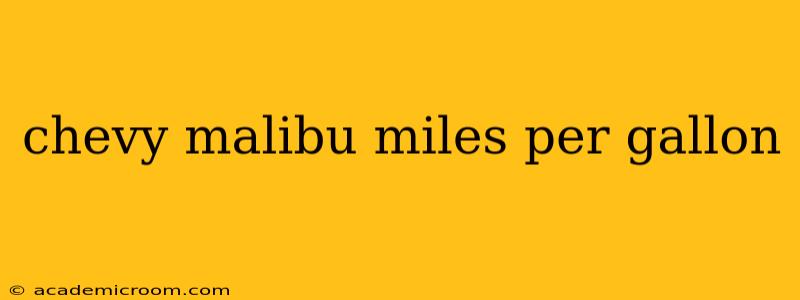The Chevy Malibu has long been a popular choice for drivers seeking a balance of style, comfort, and affordability. But a crucial factor for many car buyers is fuel efficiency. This comprehensive guide delves into the miles per gallon (MPG) you can expect from a Chevy Malibu, exploring factors that influence fuel economy and answering common questions.
What is the average MPG of a Chevy Malibu?
The average MPG for a Chevy Malibu varies considerably depending on the model year, engine type, and driving conditions. Generally, you can expect to see city MPG ranging from 20 to 28 and highway MPG from 29 to 36. However, these are just estimates. Actual MPG can be significantly impacted by several factors, which we'll discuss below. Newer models often boast improved fuel economy compared to older generations. Consulting the official EPA fuel economy estimates for the specific year and trim level of the Malibu you're interested in is crucial for the most accurate information.
How can I improve my Chevy Malibu's MPG?
Several driving habits and maintenance practices can significantly impact your Chevy Malibu's fuel efficiency. Here are some key tips:
- Maintain proper tire pressure: Underinflated tires increase rolling resistance, leading to reduced MPG. Regularly check and inflate your tires to the recommended pressure listed in your owner's manual.
- Drive smoothly: Avoid aggressive acceleration and braking. Smooth, consistent driving conserves fuel.
- Use cruise control: On long highway trips, cruise control helps maintain a consistent speed, improving fuel economy.
- Reduce weight: Carrying unnecessary weight in your vehicle reduces MPG. Remove any items you don't need.
- Regular maintenance: Ensure your vehicle is properly maintained, including regular oil changes, air filter replacements, and tune-ups. A well-maintained engine runs more efficiently.
- Avoid idling: Excessive idling wastes fuel. Turn off your engine if you'll be stopped for more than a minute.
Does the Chevy Malibu engine type affect MPG?
Yes, the engine type significantly impacts fuel efficiency. Over the years, Chevy Malibu models have featured various engine options, including four-cylinder and V6 engines, as well as hybrid variants. Generally, four-cylinder engines offer better fuel economy than V6 engines, while hybrid versions typically provide the best MPG. For example, a Malibu with a smaller, more efficient four-cylinder engine will achieve higher MPG than one with a larger V6 engine.
What are the different Chevy Malibu models and their MPG ratings?
The specific MPG for a Chevy Malibu depends heavily on the model year and trim level. Chevy has offered various trims over the years, each with its own engine options and resulting fuel economy figures. To find the exact MPG for a particular model, you should consult the EPA's FuelEconomy.gov website or the owner's manual for that specific vehicle. This will provide the most accurate and up-to-date information.
How does driving style affect Chevy Malibu MPG?
Your driving style is a major factor influencing your Malibu's fuel efficiency. Aggressive acceleration, hard braking, and excessive speeding significantly reduce MPG. Conversely, smooth, consistent driving, utilizing cruise control on highways, and avoiding rapid changes in speed contribute to better fuel economy.
Does the Chevy Malibu hybrid get better MPG than the gasoline version?
Yes, the Chevy Malibu hybrid (where offered in specific model years) generally boasts significantly better fuel economy than its gasoline-powered counterparts. Hybrid models combine a gasoline engine with an electric motor, allowing for more efficient power delivery and often resulting in considerably higher MPG, both in city and highway driving. The exact improvement in MPG will vary depending on the specific model year and driving conditions.
This guide provides a general overview of Chevy Malibu MPG. Always refer to official sources for the most accurate information specific to the model year and trim level you are interested in. Remember that your actual MPG may vary based on your driving habits and conditions.
